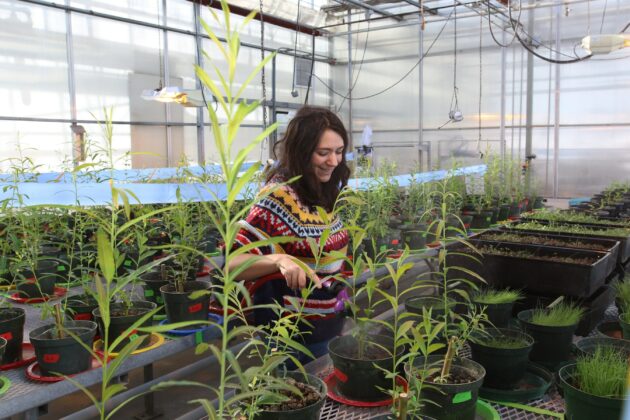
News
University project uses genomics to reduce the carbon footprint of the agri-food industry
September 6, 2023
By
Canadian Manufacturing


Joan Laur, member of UdeM’s Plant Biology Research Institute (IRBV). Credit: Adrien Frémont (CNW Group/Institut National de la recherche scientifique (INRS))
MONTREAL — A project by scientists at Université de Montréal, the Institut national de la recherche scientifique (INRS), and Western University, in Ontario, has been awarded $6,545,700 in funding to help reduce agri-food byproducts and their greenhouse gas emissions.
In Canada, agriculture, as well as food waste and its management, together produce more CO2 in a single year than passenger transportation. With that in mind, new approaches are essential to reduce the carbon footprint of the country’s agri-food sector.
The team co-directed by professors Joan Laur (IRBV) and Louise Hénault-Ethier (INRS) has set itself the goal of better understanding and optimizing the way microorganisms transform organic matter. In other words, how are agri-food byproducts or food leftovers biodegraded by microorganisms, fungi or insects that feed on them?
“We’re hoping to optimize natural transformation bioreactors, such as mushroom and insect farms, which are already used by urban farmers; with this process, waste will be transformed into food or fertilizers,” says Laur, a co-investigator on the project and member of UdeM’s Plant Biology Research Institute (IRBV).
“We can really reduce the carbon footprint of the agri-food system by creating a circular economy inspired by the natural functioning of ecosystems, and optimize these applications using the power of genomics,” adds co-investigator Hénault-Éthier, an associate professor at the INRS and director of its Eau Terre Environnement research centre.
Initially, their research will focus on urban settings, with Montreal serving as a true ‘living laboratory.’ With an area of almost 500 square kilometres that includes a dozen microbreweries, nearly 150 bakeries and many other producers of organic matter scattered throughout the city, Montreal is considered the ideal location for this project.
Using genomics tools – that is, tools involving genetic structure and DNA – the scientists will be able to study the interactions between the microorganisms that take part in the biodegradation process.
“We’ll be able to test how biological processes can be harnessed to improve what bacteria, insects and fungi consume, and to reduce greenhouse gas emissions before, during and after bioreaction,” explains Laur. “The microbiological biodiversity involved here could be of interest to agriculture and the agri-food sector as a whole.”
The team will work closely with a number of circular-economy partners, including Tricycle, Mycélium Remédium, and Compost Brome, that operate nature-inspired bioreactors. The aim of this collaborative research is to recover organic waste at different stages of the agri-food chain.
In all, about twenty researchers from four universities (Université de Montréal, INRS, Western University, and McGill University) will be working on this large-scale, multidisciplinary project, in collaboration with nearly thirty partners from the community including, besides the Montreal Botanical Garden and the IRBV: TriCycle, Mycélium Remédium, Still Good, Brome Compost, Blanc de gris, La ligne verte, Vignoble de la Bauge, City of Montreal, Cégep de Victoriaville, RECYC-QUÉBEC, Synergie Montréal, David Suzuki Foundation, Équiterre, Canadian Parks and Wilderness Society (Quebec), Table filière des insectes comestibles du Québec, Invers, 3 Brasseurs, Boulangerie Jarry, EtOH Brewery, Harricana Brewery, LOOP, Collège Ahuntsic, and Parafilms.
“This teamwork between entrepreneurs, structuring organizations, and the research community is an incredible driver of innovation,” said Hénault-Éthier. It will give us the opportunity to identify concrete solutions and contribute, together, to the fight against the climate crisis.”
Print this page